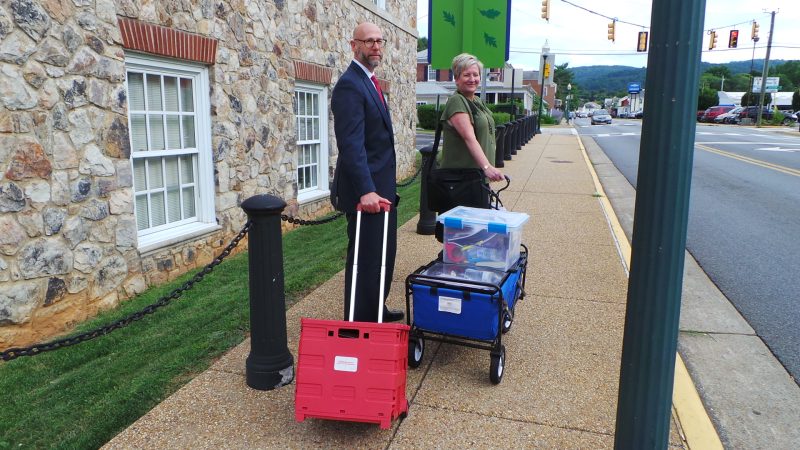
During his Valley Forge speech earlier this month, where he stated this election is about whether democracy would survive, President Joe Biden asked, “Is democracy still America’s sacred cause?”
Biden believes former president and Republican frontrunner Donald Trump wants to end democracy while his campaign aims to preserve it. Now, Biden may be calling for democracy, but Trump is currently removed from primary ballots of Colorado and Maine. Even more, Democrats have blocked members of their own party from challenging the president in some primaries.
Holding primaries and challenging a sitting president are uncommon. Historically speaking, there have been four eligible presidents who were not renominated, the last of which being in LBJ in 1968.
Normally, incumbent presidents are not challenged and many states declare them winners without holding primaries. Yet, recent times are far from normal. Trump has several pending court cases. And, on the Democratic side, according to ABC News, Biden has the lowest approval ratings (about 33%) in the past 15 years. With numbers like this, it seems only right that other Democrats challenge Biden for the presidency.
In at least eight Democratic state primaries, one or more candidates challenging Biden are missing from the ballot. Currently, the two leading Democratic challengers, Minnesota Congressman Dean Phillips and Marianne Williamson, author and founder of Project Angel Food, are missing from the ballot. Earlier Robert Kennedy Jr. threw his hat in the ring but when it was rejected, he decided to run as an Independent.
It is difficult to call anyone a contender as Democrats have not held debates, and states are ignoring candidates on their primary ballots. Even if the Democratic Party allows these challengers to run, they will face an uphill battle, but not an impossible one.
In several articles, I have said that the political craziness of 1968 is very similar to our own. When it comes to challenging a sitting president, once again, this comparison holds true.
In 1968, incumbent President Lyndon B. Johnson was preparing for a second run (it would be his third term as he completed John F. Kennedy’s term after his assassination, but by law a president can serve for 10 years.)
Like Biden, LBJ’s approval ratings were incredibly low, under 40%. Johnson’s biggest issue had been the war in Vietnam, which he claimed America was winning. However, 1968 began with the Tet Offensive which killed more than 2,600 American soldiers. Because of Johnson’s handling of the war, the student movement (student activists aiming to promote political, environmental or social change) began calling for Robert Kennedy, the younger brother of slain President John F. Kennedy, to challenge Johnson in the primaries.
Johnson and Robert Kennedy were famous political rivals. Kennedy wanted to replace Johnson and change his policies. Not knowing if he could win, and worried that an attempt might not only hurt his future chances but also divide the Democratic Party, Kennedy refused to run.
The student movement found another champion in U.S. Sen. Eugene McCarthy of Minnesota, who was critical of Johnson and his war policies. McCarthy did not believe the nation could survive four more years under the Johnson administration.
Knowing the odds were against him, students still rallied behind McCarthy. Many cut their hair and put on nice clothes to “Get Clean for Gene” and canvased neighborhoods. As always, the first primary was held in New Hampshire. To everyone’s surprise, McCarthy came in a close second, Johnson 49% to McCarthy’s 41%.
With blood in the water, Robert Kennedy also decided to challenge Johnson. On March 16, Kennedy threw his hat into the ring.
To the surprise of Kennedy, McCarthy and the nation, Johnson announced on March 31 that for the good of the nation in a time of crisis he would no longer seek the nomination of his party.
For only the fourth time in our nation’s history, a sitting president would not be renominated, opening the door for Kennedy. Yet, McCarthy had a head start and many of the students had already committed to him. It would take until May 7 for Kennedy to win his first primary in Indiana.
Kennedy and McCarthy went back and forth winning states, neither gaining a clear advantage. They also had to face a new challenger in Hubert Humphrey, Johnson’s vice president, who took up Johnson’s fight after he left the race. The Democratic Party was clearly split as the more liberal wing and students fought between McCarthy and Kennedy and the moderate Democrats supported Humphrey.
It went that way until the California Primary on June 2. After Kennedy’s win, he, too, was assassinated. Once again, the nation was in crisis as a second Kennedy had been shot down. As the nation mourned, McCarthy suspended his campaign for a while, opening the door for Humphrey.
I have often heard that if Kennedy had not been shot, he would have won the primary and beaten Nixon. I am not as convinced. The primaries were about to head south where Kennedy was not as popular. We will never know as Kennedy died in California and Humphrey was able to capture the nomination at the Chicago convention only to lose to Nixon in the general election. While this election was marred with tragedy, it did demonstrate the democratic process in action.
It is rare to challenge a sitting president, but under the right circumstances it may be necessary. While Johnson was not happy with the outcome, at least the challengers were allowed to stand up and say there can be a different path. Yet, in our current election, instead of a candidate, democracy may be what’s assassinated.
James Finck is a professor of history at the University of Science and Arts of Oklahoma. He may be reached at HistoricallySpeaking1776@gmail.com.
















